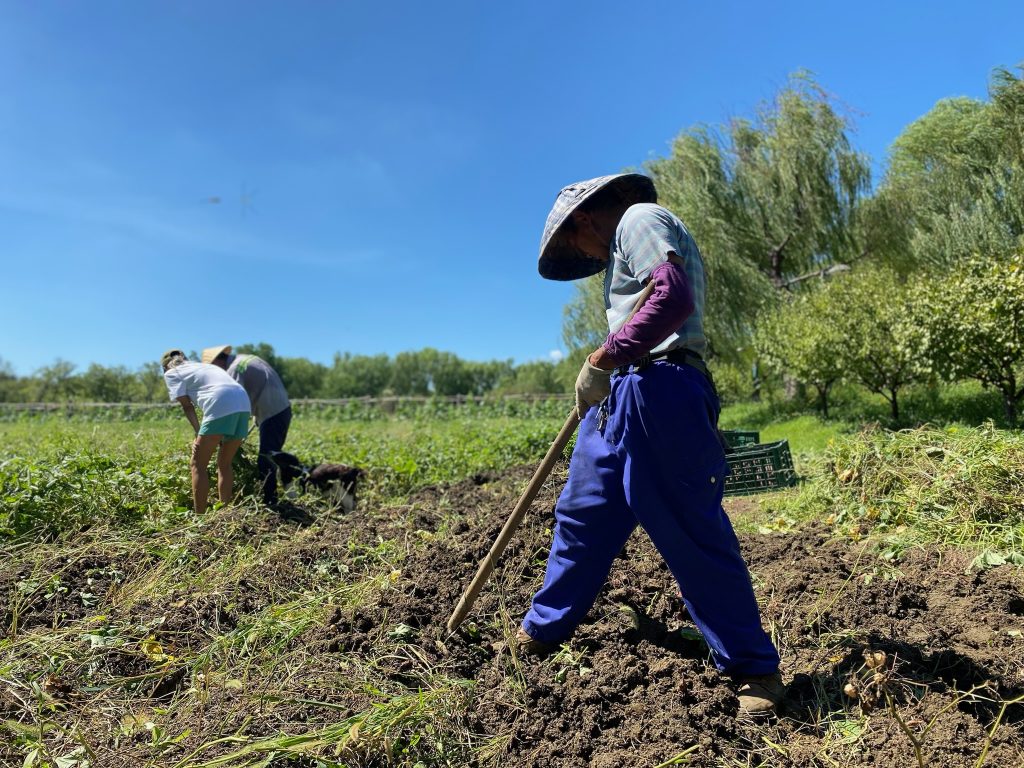Kunshan, China – When joining supermarket supply chains, crops must meet strict standards regarding shape and color, which detracts from the natural diversity of produce. “This focus on uniformity doesn’t reflect the reality of farming, where nature thrives on diversity. It compromises the integrity of organic farming, which should celebrate natural variations.” says Tang Yaozhong, the operator of Kunshan’s Yuefeng Island Organic Farm (悦丰岛有机农场).

As concerns about climate change intensify, a grassroots movement is taking foot in Kunshan, where Yuefeng Island is leading the way in promoting sustainable agricultural practices. Supported by the local government, the farm not only cultivates crops but also fosters community engagement and awareness about the importance of organic farming in addressing environmental challenges.
Every week, a group of 12 students from Duke Kunshan University visits Yuefeng Island to gain firsthand experience in organic farming practices. Guided by Jiawen Cai, Senior Coordinator of Undergraduate Academic Activities, and Professor Kaley Clements, the students delve into the intricacies of agriculture, learning about essential topics such as seed diversity, irrigation techniques, and the impacts and long-term costs of monoculture farming practices.
One of the critical lessons emphasized during these visits is the significance of seed diversity. Diverse seeds contribute to healthier soil and more resilient crops by allowing the soil to rest and regain nutrition, which are essential for combating the impacts of climate change. In contrast, conventional agricultural practices give way to monoculture—the repetitive cultivation of a single crop on the same plot of farmland. While effective for immediate and larger yields, monoculture can exhaust soil health by depleting nutrients, making the soil less fertile over time. This loss of diversity raises the risk of crop failure, making cultivating diverse varieties even more crucial.

“Seed diversity is vital not only for maintaining soil health but also for adapting to climate variations,” explained Clements. “Organic farming practices take longer but are ultimately more sustainable and beneficial for the environment.” At Yuefeng Island, this principle is put into action through the preservation of 62 types of rice, 18 types of wheat, 16 types of tomatoes, as well as various types of soybeans and green beans that add up to a total of 167 types of seed.
The farm exchanges these seeds with local communities, in an effort to cultivate and maintain seed diversity. According to The Food and Agriculture Organization, this practice strengthens the plants’ resilience against climate change, reinforcing the ecosystem’s adaptability to environmental shifts.
Despite the benefits of organic farming, there are obstacles posed by neoliberal agricultural policies. The emphasis on free-market principles has often led to unsustainable practices that prioritize immediate yields over long-term environmental health. This shift has resulted in a significant loss of crop diversity, undermining the potential for sustainable farming methods.
The Challenge of Neoliberalism in Agriculture
“Under the current free-market system, it’s easy for farmers to feel pressured to produce high yields quickly, often at the expense of sustainability,” says Tang. “Organic farming requires patience and commitment, but the benefits to the environment and community are invaluable.”
Tang emphasized that organic products can be as affordable as supermarket offerings; however, they are often difficult to find at the same scale due to unfair pricing systems. He says farmers are frequently offered low prices for their crops, making it challenging to maintain their farming operations and support soil recovery processes. Yuefeng Island’s success can be largely attributed to its ability to engage the local community. The farm encourages local residents to participate in organic farming practices, creating a sense of collective responsibility toward sustainable agriculture.

As the impact of climate change becomes increasingly evident, initiatives like those at Yuefeng Island offer a glimpse of hope. Through education, community involvement, and a commitment to sustainable practices, Tang and the DKU farming community believe this organic farming movement in Kunshan is addressing immediate food needs and contributing to a more resilient and environmentally conscious future.

